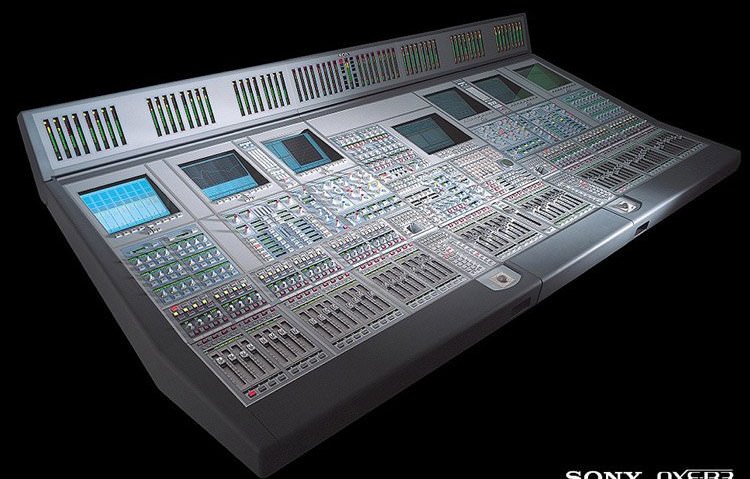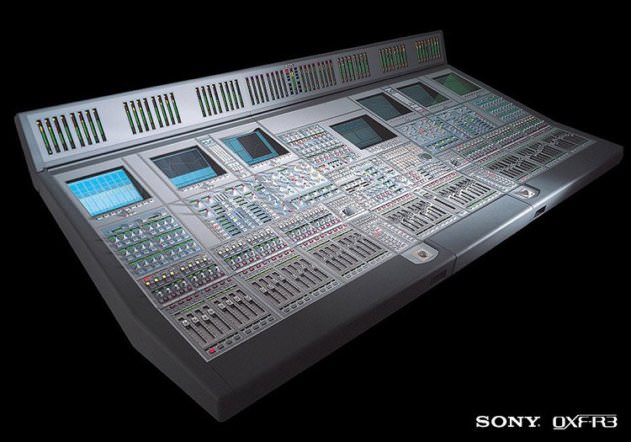Sony OXF-R3
The Sony OXF-R3 was, in its day, the best digital mixing console money could buy. The story begins in 1989, when engineer Paul Frindle left SSL – where he had worked on the G series console and initial development of digital mixer technology – to set up his own company, Oxford Digital. Oxford’s first contract was to develop a new flagship digital mixer for Sony.
In a lengthy interview with Avanturb, Frindle explained the challenge: “The Oxford Digital initiative was inspired by a single-minded and burning desire to realise the truly ground breaking advantages of digital processing. As the cultural divide between the analogue and digital fraternities continued to grow unbearably, it seemed that realising this goal required a completely different environment and mindset.”
In 1996, Sony finally released the OXF-R3, a fearsomely expensive digital console that helped usher in a new era of even more precise automation, total recall and truly professional digital signal processing. The EQ was an ultra-precise five-band parametric design with high- and low-pass shelf filters.
At a list price of a million dollars, the R3 was by no means a common mixer. Second-hand prices eventually dropped and a few lucky dance producers got their hands on them (we’re led to believe German techno producer Alexander Kowalski owned one at one point), but generally speaking the Oxford was the preserve of mega-budget commercial studios. So why does it justify inclusion here? Because in 2002, the Oxford EQ was ported from the original DSP code and released as a software plugin for Mac and PC DAWs, immediately setting a benchmark for ‘surgical’ EQ.
Chopstick explains: “I use the Oxford Plugin for all surgical procedures. It’s great for finding the bad frequency and cutting it out with a really sharp bandwidth. I find it very clean and solid sounding. It’s pretty useful for any sound in electronic music. It’s also my go-to EQ filter for cutting the lows or highs depending on the nature of the audio material.”
In 2002, the Oxford EQ was ported from the original DSP code and released as a software plugin, immediately setting a benchmark for ‘surgical’ EQ.
There are plenty of other choices of surgical EQ these days (we also like Fabfilter Pro-Q and Universal Audio’s cheekily-named Cambridge) but the Oxford EQ goes down in history as one of the first times the technology from a hugely expensive piece of hardware was ported to more easily affordable software. Buying an Oxford console is probably a step too far for most of us – especially since they’re no longer supported by Sony and starting to show their age – but the Oxford EQ allows us all access to technology which was very recently at the cutting edge.


08.29 PM
I love you all.
08.53 PM
You missed KUSH! for higher, simply the best.
08.55 PM
PS I dot think you acknowledged that precision cuts are a different ballgame to those beautiful wide sweeps. Different tool.s.
09.00 PM
for me, Pultec for bass. Cambridge for tight cuts. and natives for gentleness. If that makes sense. Either way, keep up the good work.
09.29 PM
Maag?
03.01 AM
The most important Eq curve for dance music is the 24 or preferably 48 dB/Oct slope highpass filter. It allows producers with even average abilities to create low end and low mids that are complex and layered yet intelligible. Most producers I know have an Eq doing just this on good percentage of the tracks in every song. I’d say that for and EQ to truly be the EQ of dance music it would need to be able to not only do this but be available to do it on 10 or more (usually more) stereo tracks at the same time. This is where the humble native EQ in most daws shines with its low DSP rent high flexibility. It might not be the most glamorous or best sounding EQ but it might do more for the bass than even a pair of hardware pultec or even a gaggle of dsp pultecs. Add in its pre and post internal spectrum analyzer and it seems pretty amazing.
04.25 PM
I Love the IK Pulteq, it just makes most things sound better. Too easy to get carried away with it though.
06.48 PM
Just some notes on availability of these EQs as emulations. Both the API 500 series and Sonnox Oxford have officially licenced plug-in versions from Universal Audio.
http://www.uaudio.com/store/equalizers/api-500-series-eq-collection.html
http://www.uaudio.com/store/equalizers/oxford-eq.html
04.14 AM
KEEP up the phenomenal work guys!
10.16 AM
I own a clariphonic myself, and I don’t think there’s a better eq to focus and lift the highs on your 2-buss. Personally, I’m getting ready to sell my SSL E-series EQs so that I can pickup an Electra from Kush…
He’s doing it right.
11.59 AM
Awesome magazne with loads of very useful tricks and insights for the general producing general producers that just don’t have the means to approach music with real world professional knowledge. Very grateful and wish you a continuesly sucessful and quality ensured publication of such! 100% support :)
06.41 PM
Um how there is no baxendall eq here is just beyond me. The most used and useful eq of all time. Didn’t get a look in.
02.54 AM
Kush isn’t a secret anymore, the word is out. The best, most intuitive and creative EQ and Compressor I’ve ever used. Slow to upgrade completely to AAX, but worth the wait.
01.10 PM
Oh .. I love SSL EQ man ! its the amazing shit u can ever get 😀
12.54 AM
what about the millennia NSEQ-2, the GML 8200 and Maselec Mea 2 ? (there’s also the Crane IBIS)
06.12 AM
That mackie EQ is fucking shite, I can’t believe you put that next to the SSL, which is the mutt’s nuts.
02.00 AM
I use the 5500 in my mastering rig everyday. It’s stellar for fast program, passes every transient perfectly. Big bold sound. Not what I would call transparent but perfect for electronic music.
Will Brodeur
lacquer channel mastering.
10.33 PM
Elysia Xpressor is one notable absence from this list… the Elysia stuff is practically made for electronic music, so clean and precise.
06.03 AM
So why you not tell anything about NEVE EQ’s?